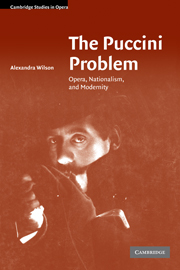Book contents
- Frontmatter
- Contents
- List of illustrations
- Acknowledgements
- Note on translations
- Introduction
- 1 Inventing an Italian composer
- 2 La bohème: organicism, progress and the press
- 3 Tosca: truth and lies
- 4 A frame without a canvas: Madama Butterfly and the superficial
- 5 Torrefranca versus Puccini
- 6 The Italian composer as internationalist
- 7 A suitable ending?
- Epilogue
- Appendix 1: selected newspapers and journals
- Appendix 2: personalia
- Notes
- Bibliography
- Index
Epilogue
Published online by Cambridge University Press: 22 September 2009
- Frontmatter
- Contents
- List of illustrations
- Acknowledgements
- Note on translations
- Introduction
- 1 Inventing an Italian composer
- 2 La bohème: organicism, progress and the press
- 3 Tosca: truth and lies
- 4 A frame without a canvas: Madama Butterfly and the superficial
- 5 Torrefranca versus Puccini
- 6 The Italian composer as internationalist
- 7 A suitable ending?
- Epilogue
- Appendix 1: selected newspapers and journals
- Appendix 2: personalia
- Notes
- Bibliography
- Index
Summary
The responses that greeted Turandot marked a turning-point in its composer's reception history. After Puccini's death, even his enemies were prepared to acknowledge him as the Italian artist of his day. His status as national composer was now finally secure – to the extent that Renato Mariani would go so far as to write in 1939 that ‘Italy and Puccini are one and the same’ – and the Fascist regime sought to appropriate his music for its own political ends. Adriano Lualdi would write in the 1950s: ‘as far as the theatre is concerned, Puccini's œuvre in fact represents Italian music in the period 1880–1910 much more truthfully than the masterwork Falstaff and much more faithfully than Cavalleria rusticana’. Finally, or so it seems, Puccini had won unequivocal endorsement from the majority of the critics; even if they were baffled by Turandot itself, there can be no doubt that its composer was now seen as one of Italy's most significant creative figures. The question of Puccini's Italianness – for so long a bone of contention among writers and musicologists of all political persuasions – was settled.
However, as this particular issue receded into the background, other problems came to the fore. Turandot prompted such questions: Puccini's conscious attempt to renew his style had thrown into relief the very irreconcilability of modern compositional styles with the basic aesthetic premises of Italian opera.
- Type
- Chapter
- Information
- The Puccini ProblemOpera, Nationalism, and Modernity, pp. 221 - 228Publisher: Cambridge University PressPrint publication year: 2007



